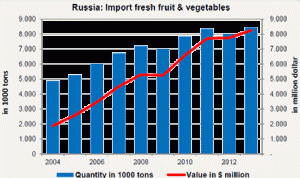Although Crimea no longer dominates the daily news, it has affected fruit export. “I think that the political situation cost volume and also price development,” said fruit exporter Kees Oskam from Vleuten. “But I’m actually happy that we can simply still deliver at these prices. It could be worse.”
“Of course we would have preferred higher prices, but the Rouble has almost halved in value and that plays an important role. There are region’s to which we can no longer export because it is too expensive. In Moscow and the surrounding areas that is not the case because the average income is higher.” Trading company Jan Oskam traditionally export top fruit to The Ukraine, but even there devaluation of the Hryvna has caused problems.
“It is a daily priority to see if we can export. I have to say last week was more difficult than this week, maybe because it was still front page news. Obviously we are talking to receivers who are equally concerned to keep trade moving,” said the trader.
“The fact that the pear price is unstable on the Russian market makes for a tricky situation because the market is and remains unpredictable,” concluded Kees. “Only a few apples go to Russia here and there, because Polish exporters have cornered the market with their lower prices, but they also complain a lot about difficulties they have with supplies from Serbia.”
